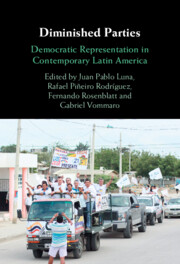Book contents
- Diminished Parties
- Diminished Parties
- Copyright page
- Contents
- Figures
- Tables
- Contributors
- Acknowledgments
- Abbreviations
- 1 Introduction
- 2 The Case of Uruguay’s Frente Amplio
- 3 Horizontal Coordination and Vertical Aggregation Mechanisms of the PRO in Argentina and Its Subnational Variations
- 4 Bolivia’s Movement toward Socialism: A Political Party Based on and Anchored in Social Movements
- 5 The Complex Interaction between Vertical Interest Aggregation and Horizontal Coordination: The PRD and MORENA in Mexico
- 6 PLN and PAC: Two Costa Rican Parties with Constituencies Evolving in Opposite Directions
- 7 The Case of the Traditional Parties in Paraguay
- 8 The Colombian Liberal Party and Conservative Party: From Political Parties to Diminished Subtypes
- 9 “Normal” Parties in Extraordinary Times: The Case of Primero Justicia and Voluntad Popular in Venezuela
- 10 Diminished by Design: Ecuador’s Alianza PAIS
- 11 The Chilean PPD: A Loose Confederation of Leaders
- 12 Fujimorismo and the Limits of Democratic Representation in Peru, 2006–2020
- 13 The Unidad Nacional de la Esperanza: Guatemala’s Only True Political Party?
- 14 Conclusions
- References
- Name Index
- Organization Index
- Subject Index
6 - PLN and PAC: Two Costa Rican Parties with Constituencies Evolving in Opposite Directions
Published online by Cambridge University Press: 09 December 2021
- Diminished Parties
- Diminished Parties
- Copyright page
- Contents
- Figures
- Tables
- Contributors
- Acknowledgments
- Abbreviations
- 1 Introduction
- 2 The Case of Uruguay’s Frente Amplio
- 3 Horizontal Coordination and Vertical Aggregation Mechanisms of the PRO in Argentina and Its Subnational Variations
- 4 Bolivia’s Movement toward Socialism: A Political Party Based on and Anchored in Social Movements
- 5 The Complex Interaction between Vertical Interest Aggregation and Horizontal Coordination: The PRD and MORENA in Mexico
- 6 PLN and PAC: Two Costa Rican Parties with Constituencies Evolving in Opposite Directions
- 7 The Case of the Traditional Parties in Paraguay
- 8 The Colombian Liberal Party and Conservative Party: From Political Parties to Diminished Subtypes
- 9 “Normal” Parties in Extraordinary Times: The Case of Primero Justicia and Voluntad Popular in Venezuela
- 10 Diminished by Design: Ecuador’s Alianza PAIS
- 11 The Chilean PPD: A Loose Confederation of Leaders
- 12 Fujimorismo and the Limits of Democratic Representation in Peru, 2006–2020
- 13 The Unidad Nacional de la Esperanza: Guatemala’s Only True Political Party?
- 14 Conclusions
- References
- Name Index
- Organization Index
- Subject Index
Summary
This chapter departs from the classic definition of parties and applies a novel theory that casts doubt on the validity of the minimalist definition using two Costa Rican cases. Discussion of horizontal and vertical mechanisms as applied to the National Liberation Party (PLN) and Citizens Action Party (PAC) reveals strong similarities in terms of party organizations and challenges for policy consistency at the local level combined with marked contrasts in their capacities to process collective demands. The main finding of this chapter is that the PLN and PAC, two of the most prominent parties in the country, are quite different one from another. Regardless of their remarkable differences, both parties share the feature of having evolving constituencies, though their respective constituencies are evolving in opposite directions. The PLN fits the classic definition of a party with a well-organized and fully developed constituency suffering from decreasing membership over the last two decades. The PAC, on the other hand, does not have a sufficiently developed constituency to be considered a fully functioning party. The PAC does, however, have activists and is developing its membership.
Information
- Type
- Chapter
- Information
- Diminished PartiesDemocratic Representation in Contemporary Latin America, pp. 111 - 128Publisher: Cambridge University PressPrint publication year: 2021
Accessibility standard: Unknown
Why this information is here
This section outlines the accessibility features of this content - including support for screen readers, full keyboard navigation and high-contrast display options. This may not be relevant for you.Accessibility Information
- 2
- Cited by
